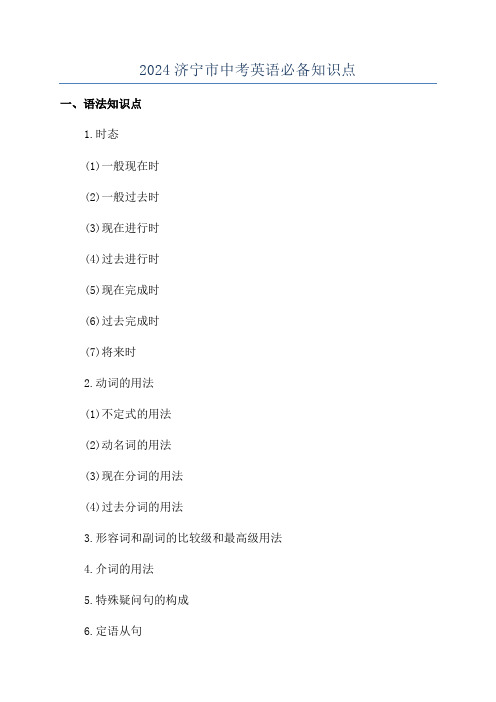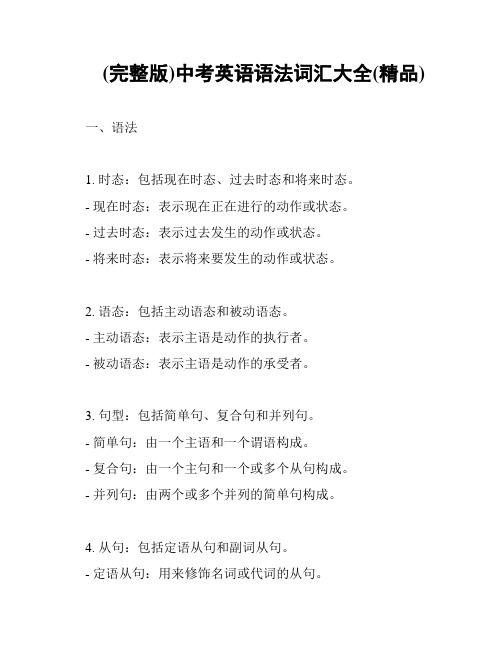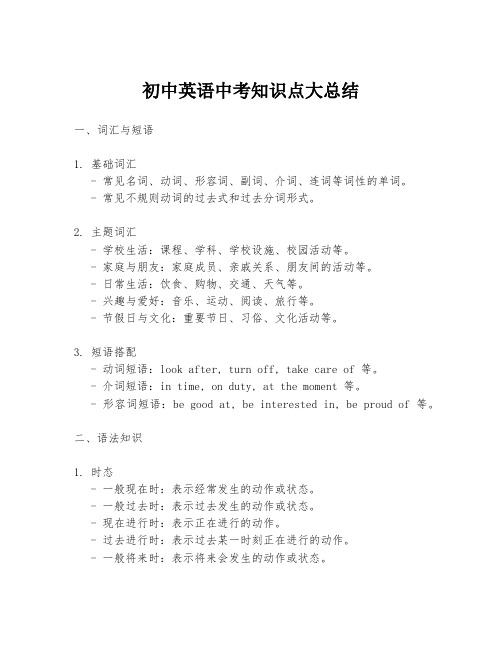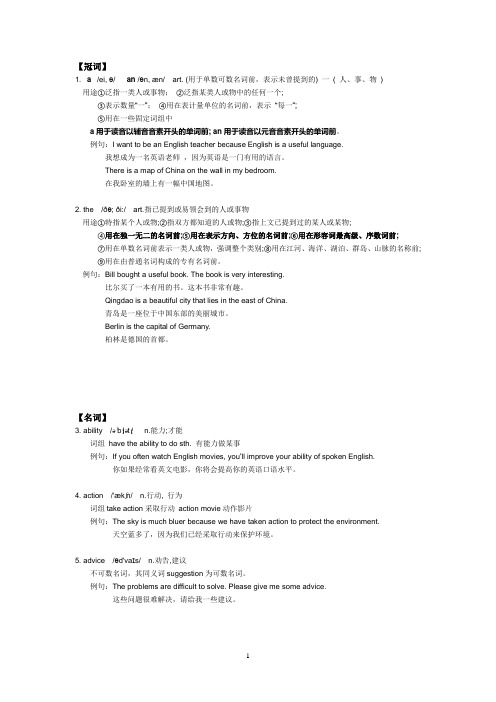中考英语重点词汇和句型用法总结
2024济宁市中考英语必备知识点

2024济宁市中考英语必备知识点一、语法知识点1.时态(1)一般现在时(2)一般过去时(3)现在进行时(4)过去进行时(5)现在完成时(6)过去完成时(7)将来时2.动词的用法(1)不定式的用法(2)动名词的用法(3)现在分词的用法(4)过去分词的用法3.形容词和副词的比较级和最高级用法4.介词的用法5.特殊疑问句的构成6.定语从句7.状语从句8.主谓一致9.否定词的用法10.句型转换二、词汇与拼写1.日常词汇(1)数字和时间(2)食物和饮料(3)家庭与人际关系(4)身体和健康(5)学校和学习(6)旅行和交通(7)环境和自然(8)运动和娱乐2.常见动词短语(1)动词+名词搭配(2)动词+副词搭配(3)动词+介词搭配(4)动词+形容词搭配3.常见名词短语(1)表示时间与地点的名词短语(2)表示人物与事物的名词短语(3)表示情感与状态的名词短语4.同义词与反义词5.常见词组和固定搭配6.词汇拼写三、阅读技巧与综合应用1.阅读理解题型(1)判断题(2)选择题(3)完形填空(4)阅读填空(5)短文改错2.阅读策略(1)全文阅读理解(2)精读理解(3)不同文体的阅读策略(4)利用上下文推测词义(5)段落大意的判断3.理解语篇(1)理解计划、通知和广告等文体的语篇要素(2)理解记叙文、说明文、议论文等不同文体的语篇结构4.语句翻译(1)句子的基本结构和语法规则(2)含有特殊结构和表达方式的句子的翻译5.书面表达(1)书信写作(2)日记写作(3)作文写作四、听力技巧与应用1.听力材料分析(1)听力材料类型及其特点(2)听力材料中常见的句型和表达方式2.听力技巧(1)提前预测信息,分析选项(2)留意关键词(3)注意听力材料中的数字、时间和地点等重要内容(4)掌握听力时的笔记方法和记号符号3.听力练习和模拟考试(1)听力材料的选择和练习(2)模拟考试的实施以上就是2024济宁市中考英语必备知识点,大致涵盖了语法、词汇拼写、阅读技巧和综合应用、听力技巧和应用等方面的知识点。
(完整版)中考英语语法词汇大全(精品)

(完整版)中考英语语法词汇大全(精品)一、语法1. 时态:包括现在时态、过去时态和将来时态。
- 现在时态:表示现在正在进行的动作或状态。
- 过去时态:表示过去发生的动作或状态。
- 将来时态:表示将来要发生的动作或状态。
2. 语态:包括主动语态和被动语态。
- 主动语态:表示主语是动作的执行者。
- 被动语态:表示主语是动作的承受者。
3. 句型:包括简单句、复合句和并列句。
- 简单句:由一个主语和一个谓语构成。
- 复合句:由一个主句和一个或多个从句构成。
- 并列句:由两个或多个并列的简单句构成。
4. 从句:包括定语从句和副词从句。
- 定语从句:用来修饰名词或代词的从句。
- 副词从句:用来修饰动词、形容词或副词的从句。
二、词汇1. 名词:用来表示人、事物、地方或抽象概念的词语。
- 例子:apple(苹果)、book(书)、friend(朋友)、love (爱)2. 动词:用来表示动作、行为或状态的词语。
- 例子:run(跑)、eat(吃)、sleep(睡觉)、play(玩)3. 形容词:用来描述事物的特征或性质的词语。
- 例子:big(大)、beautiful(美丽)、happy(快乐)、tired (疲劳)4. 副词:用来修饰动词、形容词或其他副词的词语。
- 例子:quickly(快速地)、very(非常)、always(总是)、well(好)5. 介词:用来表示位置、方向、时间、方式等的词语。
- 例子:in(在……里面)、on(在……上面)、before (在……之前)、with(和……一起)以上是中考英语语法和词汇的基本内容,希望对你有所帮助。
(完整word版)【英语中考高频词汇】历年中考30个高频单词短语用法总结

【英语中考高频词汇】历年中考30个高频单词/短语用法总结1. cost / take / spend / pay 花费花费时间做某事:It takes sb some time to do sth .= sb spend some time (in)doing sth .= sb spend some time on sth .某人花钱买某物:sb spend some money on sth .= sb pay some money for sth.= sth cost sb . some money .注意:⑴ cost 和 pay 只指花费钱,take 只指花费时间,spend 可以指花费钱也可以指花费时间。
⑵ spend 和 pay 主语都是人, cost 主语是物,take 一般用于 It takes sb some time to do sth. 句型中。
2. thanks for 为…...而感谢Thanks for inviting me to your birthday party .谢谢你邀请我来你的生日聚会。
thanks to 多亏/由于Thanks to your help. I got good grades .幸亏你的帮助,我才取得好成绩。
3. 多么…...what 名词;how 形容词/ 副词What bad weather !多么糟糕的天气啊!How hard he works !他工作多么努力啊!What fresh vegetables !多么新鲜的蔬菜啊!How cute a monkey it is !它是一只多么可爱的猴子啊!4 . 因为......;由于......because(连词)从句because of(介词短语)名词(短语)I didn’t go to school because I had a headache.因为我头疼,所以我没去上学。
英语学考重点词汇及句型

中考英语重点短语及句型归纳一、固定搭配:1. put down 放下 shut down 把…关上 cut down 砍掉 come down下来、落下 slow down 减缓、放慢sit down 坐下 write down 写下 get down 下来,降落2. after all 毕竟.终究 after that 然后 day after day 日复一日地one after another 相继.挨次 soon/shortly after 不久以后 the day after tomorrow 后天3. come up with 找到、提出 catch up with 赶上 wake up 弄醒、醒来send up 发射 open up 开设、开办 grow up 长大pick up 拾起、捡起 hands up 举手 eat up 吃光 put up cheer upwash up clean up 打扫干净 give up doing sth.=stop doing sth.放弃做某事4. arrive at/in + n. 到达 get to +n.到达 reach + n.到达 arrive / get +adv.到达5. get…back 退还, 送回去.取回 give back=return 归还come/go back 回来/去at the back of 在…的后面 on the way (back)home 在回家路上6. at least/most 至少/多 at breakfast 早餐时 attable 在吃饭 at once 立刻,马上at school 在上学 at work 在工作 at the same time 同时 all at once突然at present , at the moment =now 现在 at a time 一次,每次 at times(sometimes)有时,be good at=do well in 善长 be clever at…be angry at sth. be surprised at…对……感到惊奇look at, laugh at 嘲笑 smile at 对……微笑shout at 对……吼叫,knock at …, arrive at… not…at all 一点也不 at first 起初at last =in the end / finally 最后、终于at night/midnight 在晚上/午夜 at noon 中午 at Christmas 在圣诞节at the age of was…years old 在…岁时at the beginning (of… ) at the end of 在…终点/末端/结束时at the foot of在…脚下 at the top/bottom of…在……的(顶)底部at any moment 任何时候at the doctor’s在医务室example 例如 for sure确定 for ever 永远 for free 免费 for long=for a long time 长期be good for 对…有益 be bad for对…有害, be famous for…, be late for…,be ready for…,be sorry for…为……感到抱歉, be thirsty for…渴望……be short for是…的简称TV is short for “television”. ask for…要求得到, look for, wait for,search for…, care for…喜欢,关心,照顾,send for…派人去请, pay for…8. come true 实现 come down 下来 comefrom=be from 来自, 出生于come in/into 进入,进来 come on 赶快 come over 过来come along 走吧,过来,快点come up 上来 come up with…想出, come out 出来,出版,(花)开,come to an end结束, come to oneself (苏醒,恢复知觉), come into use(开始被使用)9. even though=even if 即使、虽然、尽管 as if/as though 好像10. be pleased/satisfied/happy with 对…感到满意be busy with…, be strict with sb., be angry with sb.be careful with…, be patient with… be familiar with…be covered with 被…覆盖 be filled with…be expected/allowed/required/asked to do sth.被期望/允许/要求做某事be made/ seen/ heard/ noticed to do sth. 被迫/看见/听到/注意到做某事be surprised /excited/ pleased to do sth. ,be sorry/proud/willing/ready/ happy/glad/sure to do sth.be proud of 以…自豪 be short of…缺乏……be sure of…对……有把握, be fond of…喜欢, be tired of…对……厌倦be full of… speak highly of 称赞 be afraid of害怕hear of听说 (hear about / hear from sb.收到某人的来信) of course=certainly当然可以plenty of= a lot of许多 a great deal of…大量 (修饰不可数名词)the way 顺便问一下 by oneself 单独,独自 by the end of到…结束为止by now到现在为止 by then by the year 2100=by 2100 by the time (引导时间状语从句) 到…的时候one by one依次 day by day一天天地 step by step 逐步地 little by little 渐渐地by air / plane 乘飞机 by bus / train / car 乘公共汽车/ 火车/轿车(catch a bus赶公交车 get on / off the bus上/下车 take a bus to…=go to …by bus乘车去)by mistake 由于差错 by accident 偶然 by and by 不久,后来/ try one’s best(to do sth.)尽力 (做某事) do nothing but do …do one’s homework做家庭作业 do one’s lessons 做功课 do Maths exercisesdo (the/some) shopping 购物 do the cooking 烹饪do some cleaning 打扫do the / some washing洗衣服 do with sb / sth.处理 dosome exercise锻炼do a lot of research on… do a survey on… do a good job well done干得好do harm to …. 对……有害 do good to …对……有好处 in the morning 一大早 in the early spring 初春in my early days 我幼年时期 the early bus 早班车14. connect…to…把…与…连接起来 tie … to…be close to 靠近 give birth to生(孩子) lose to sb 输给某人.to one’s surprise 使人惊讶的是 to one’s joy 令人高兴的是 to tell the truth 说实话…or…或者…或者.. on either side of the street 街道任何一边(on each side of the street 街道每一边 on both sides of the street街道两边)doing sth.不停地做某事 (表示状态继续) keep on doing sth. 坚持做某事(表示动作反复进行) practise doing sth. 练习做某事 enjoy doing sth. 喜欢做某事finish doing sth.做完某事 mind doing sth.介意做某事 go on doing sth.继续做某事(同一件事) (go on to do sth.接着做某事(另一事) go on with sth. 继续某事 ) continue doing(to do)…继续做 consider doing…考虑做 suggest doing…建议做……can’t help/ stop doing sth. 情不自禁地做某事,禁不住做…… give up doing…spend …doing…, feel like doing…, have fun/ a great time doing…, have difficulty doing…, be busy doing…, be interested in doing…, be fond of doing…, be good at doing…, be crazy about doing…, how /what about doing…, worry about doing sth. , thank sb. for doing…, instead of doing…, because of doing…, be used to doing…, pay attention to doing…, look forward to doing…,prefer doing…to doing…, devote…to doing…, put one’s effort into doing…, be worth doing…17. go straight along/on 沿着…一直往前走 go down下降, go up上升,go through 经历,浏览 go by (时间)过去,经过 go over复习 go in for 参加,从事go for a walk/swim/picnic去散步/游泳/野餐, go wrong go mad/badgoshopping/swimming/skiing/skating/hiking/walking/sightseeing/boating,go to the cinema/movie去看电影 go well进展顺利, go well with…与……相配go off to 动身前往, go out外出;熄灭, go away go to work去上班,go on a study trip go on holiday 休假 want a go 想试一试18. think about 考虑 (think of 认为、想起、考虑、想到 think over 仔细考虑 )talk about 谈论, worry about 担心, How / What about…?…怎么样?…from …从…借…. (lend…to…把…借给…)from door to door 挨家挨户, from time to time 时而from now on 从今以后 from then on 从那以后be different from与…不同 (be the same as…)dressed 穿衣 get killed/married/hurt get / be lost 丢失get into进入 get out of从…出来 get off / on下/上车 get in收割 get up get to…get on/along well with sb. 与某人相处得好 get into troubleget ready for +n.为…做准备; get ready to do sth.准备做某事 get used to…习惯于……get / go to sleep (fall asleep) 入睡 (be asleep睡着) get warm 变暧 get well康复get sb. sth.=get sth. for sb. get sb. to do sth.21. look for 寻找 look at look after=take care of照看look like看起来像look over 检查,复习 look out 小心,从里向外看look the same 看起来一样look up 向上看,查询, look down 俯视 look downon/upon轻视,瞧不起look around 环视 look back on…回顾 look forward to 期望 look through 浏览22. set off 出发、动身 put off 推迟 keep off 避开、不靠近… drop off 放下(某物)turn off 关 jump off 跳离, take off 脱(衣) (飞机)起飞 show off炫耀see off 送别 fall off…从……掉下 get off, turn off, knock …off…23. half a kilo 半千克 half an hour 半小时 in half 分成两半half of the day 半天 a year and a half (one and a half years ) 一年半24. do eye exercises 做眼保健操 do morning exercises 做早操take (more) exercise (多)参加体育锻炼 an exercise book 练习本25. take part in 参加 hand in 上交 in hospital/prison 住院 /坐牢in surprise/fear 吃惊地 /害怕地 in the sun 在阳光下in trouble/danger 处于困境/危险 in a minute / moment/while 马上 i n a few years’ time=in a few years 几年以后in the future in fact 实际上 in front of…, in time, in turn依次 , in orderin order to…为了 in a way 从某种意义上讲 in some/many ways, in other ways在其它方面in this way 用这种方法 in a word 总而言之 in other words 换句话说 in all 总共,共计in a hurry 匆忙 in space 在太空 in and out of class 在课内课外in the last fifteen minutes 在最后十五分钟里 in thepast few/twenty yearsin one’s opinion依照某人的看法,在某人看来 in one’s fifties在某人50多岁时in the first/ second half 在上/下半场 in good/poor health in public in service/usein the air/sky 在空中 in the open air 在户外 in a mess 杂乱in the form of…以……的形式, in the habit of…有……的习惯26. leave for…动身去某地 leave…for…离开……去……27 feed on 以…为主食 base on 以…为根据 carry on 坚持、继续下去walk /move on 继续走/移动 depend on…依靠…… work on 从事于 look down on…turn on (the radio/computer/light/tap/ gas ) put on 穿上,上演 get on (well) with…and so on 等等 on the other hand 另一方面 on the other side of… on foot 步行on earth究竟 on the way to… , on Sundays, on the morning/afternoon/evening/night of May 1on the radio/telephone , on business on duty on holidayon time on top of…28. be famous for 以..着名 be excited about +n./V-ing对…感到兴奋be interested in 对…感兴趣 be born出生 be busy with sth.— be busy doing sth. 忙于… beamazed/surprised at 对..感到惊讶29. move away 移开 move to (搬)移到 move house move out of … move into…30. search the Internet上网 search…for…., search for sth.31. make sure 确信 make a dialogue 编对话 make a mistake 犯错误make a noise 吵闹 make faces 做鬼脸 make friends (with) 和..交朋友 make room/space for 给..让地方 make a living,(谋生) make tea 沏茶 make money 赚钱 make an excuse, make a decision作出决定make a suggestion, make (great) progress in…在……取得(巨大)的进步, make a speech, make a promise, make the bed, make notes on…make a great difference to…, make (good) use of…, make fun of… ,make a contribution to (doing)sth. 为……作贡献make a telephone call to sb. /ring sb. up /give sb. a call /phone/call/telephone sb. 给某人打电话to do sth 过去常常做某事 get/ be used to doing sth. 习惯于做某事33. leave sth+介词短语“把……忘记在某处”34.动词不定式做宾语:wouldlike/want/hope/wish/prefer/decide/plan/begin/start/cho ose/prepare/agree/ continue/ volunteer/ promise/ offer/ afford/ fail/refuse/expect/ manage to do s th.动词不定式做宾语补足语:encourage sb. to do sth. 鼓励某人做某事 allow sb. to do sth. 允许某人做某事want/would like/ need/ require/ expect/ invite/ encourage/ order/ tell/ ask/ warn/ advise/ promise/ remind/ teach/ allow sb. to do sth.含有不定式的短语have no choice but to do sth. do/try on e’s best to do sth. do what/all sb. can to do sth.can’t wait to do sth. 迫不及待做某事不带to的不定式短语:do nothing but do sth. had better(not) do sth. can’t do… but do…,would rather do…than do…, prefer to do…rather than do…,Why not do…? Would you (please)(not) do…?一“感”,二“听”,三“让”,四“看”feel/listen to/ hear/ make/have/let/ see/ watch/ look at/ notice sb.do sth.改为被动语态要加to:be made/ seen/ heard to do sth.注意区别下列短语:try to do…/ try doing…; forget/remember to do/doing…, stop to do/ doing…; mean to do/doing…; go on todo/doing…/ be afraid of doing…/ be afraid to do…35.区别hear sb. do (doing)sth. 听见某人(正)做某事watch /see/ notice sb. do/ doing sth.sb. (to) do sth .with sth. 帮助某人做某事with one’s help在某人的帮助下with the help of… with pleasure 乐意 withjoy/excitement(computer)games, play hide-and-seek, play sports, play a joke/trick on sb., play with…,play chess/ cards/volleyball/football/badminton/tennis/table tennis, play the piano/violin/guitarplay ball games, play the role of…, play an important role in…into 走进 pour into 倒入… walk into get into move into39. for the first time 第一次 at first起初 first of all 首先40. leave a message for sb. 给某人留条 give sb. a message take a message for sb.给某人捎口信 pass on a message for/ to sb. 替某人传口信/ 传口信给某人41. take photos / pictures 照像 take away拿走 take out 取出 take...out of...take off 脱下,起飞 take up开始,从事,占据 take down take in 吸收take care 当心 take care of take medicine 服药 take one’s temperature量体温take it easy 别紧张,放轻松 take a walk/rest/seat 散步/休息/就座 take a looktake a bath/shower take place 发生 take part in…takeaction to do sth.,take turns to do sth.轮流做某事 take a bus/train/plane, take an interest in...take exercise 锻炼 take (a) pride in… take one’s advice 接受某人建议42. learn by oneself / teach oneself 自学 learn by heart 背熟,背诵learn from…向……学习 learn…from…向……学习…… , learn about…了解,知道43. be interested in…, be weak in…在……薄弱, be rich in…在……富有,be strict in sth.,be experienced in…在……有经验, be different in…在……方面不同44. have a try 尝试,努力(try out 尝试、试验, try on试穿) find out 找出,查明have a good / wonderful / great / fantastic/ time 玩得开心 have fun doing sth.have a (bad) cold/headache/toothache/cough/fever (重)感冒/头疼/牙疼/咳嗽/发烧have a meeting / walk / watch/ talk /chat 开会/散步/比赛/谈话/聊天have sports 进行体育活动 have nothing /something to do with 与..无(有)关have no idea 不知道 have a rest/ break/discussion/bath/showerhave lunch/breakfast/supper/dinner have no choice but to do sth.have to do sth. have on 穿着 have problems/ trouble/ difficulty with sth./ (in)doing…have an interview with sb. have a fight with sb. /havea quarrel with sb.45. 可以跟双宾语的动词: offer sb sth. 提供某人某物offer sth. to sb.promise/lend/give/show/bring/ send/pass/ hand, return/ write / teach/ tell sb. sth.(sth. to sb.)buy/ make/ sing/ draw/ get/ cook/ post sb. sth. (sth. for sb.)the first prize 获一等奖 win an award for… win the game lose the gamebeat sb./the team47. all over the world= around the world =throughout the world 全世界48. all kinds of 各种各样的 many kinds of… akind/type/sort ofIt’s kind of sb. to do sth. be kind to do sth.49. be polite/rude to sb., be kind to…, be cruel to…, be harmful to…, be friendly to…,be valuable to…=be of value to… be useful to…=be of use to… be helpful to…50. neither… nor 既不…也不…. not only … but also …不但…而且 ,either… or…要么……要么……, both… and ……和…都;既……又……51. fall behind落后 fall into…, fall in love with sb., fall down跌倒, fall over绊倒, fall off…fall asleep 入睡 fall ill生病,病倒52. all one’s life 一生 during one’s lifetime53. as soon as 一…就… as soon as possible尽快 as well = too 也 as well asas much as 差不多,多达 as little as 至少 as long as 只要 as if/though 好像regard …as 把…当作… = look on…as 把……看作as a result 因此 as a result of…由于,作为……的结果 as usual照例,像往常一样54. no matter 无论…,不管 no matter what/ who/ where/ when/how…no wonder…难怪,怪不得 no more no longer no problemno more than不过,仅仅 no less than 不少于,多达55 ever since 从那以后,此后一直现在完成时+ (ever) since +过去时.far 到目前为止 so that 以便 so as to…为的是,以便so many/much or so大约57. another two hours (=two more hours ) 又(再) 2个小时58. once/ twice/ three times a week 一周一/两/三次用how often 提问59. the number of …的数量 a (large / great) number of / large numbers of 许多……than 少于 less and less 越来越少 more than = over 多于,超过 more and moremore or less = about 或多或少,大约way to…, the answer to…, the visit/trip/journey to …, the key to…, the guide to…62. not…until/till…直到…才……until/till…直到……为止like像 look like feel like +n./V-ing 想要 sound like…听起来像like best/most/least 最(不)喜欢would like (to do) sth. 想要(做)…… would like sb. to do sth.problems/ trouble/ difficulty with sth., have problems/ trouble/difficulty (in) doing sth.away 冲走 run away逃跑 take away 带走 put away drive away pass awaylong 不久 long before / ago 很久以前 no longer = not. .any longer 不再67. send for 派人去叫 send away 派遣,发送 send out 发送 send up 发射 send off寄出year 每年 every four years 每隔四年 every other day 每隔一天 how often提问everyday English / life 日常英语/生活69. keep fit/ healthy/ silent/ quiet keep in touch with…与……保持联系get in touch with…与……取得联系keep (on) doing sth. keep a secret keep a diary keepsb. doing sth.让某人一直做keep sb. from doing…阻止某人做…… keep away from…Keep off the grass!/ get / have a letter from sb. = hear from sb 收到某人的来信show = on display/exhibition 展览filled with / be full of 充满…73. thanks to 多亏,由于 =because ofday =one day (将来)某一天 all day 终日 all night day and night 日日夜夜in a day or two 一两天内 in the old days 从前,旧社会 day after day日复一日the day before yesterday 前天 the day after tomorrow 后天 National DayWomen’s Day 妇女节 Children’s Day Mother’s Day Father’s Day Teacher s’ Day75. stop / prevent… (from) doing sth. =keep sb. from doingsth. 防止(阻止)…做某事stop to do sth.停下来去做某事 stop doing sth.停止做某事76. set out/off, 出发 set up 建立 set an example树立榜样 set fire 纵火,放火烧77. a place (places) of interest 名胜 interesting places tourist attractionsquarters of the information on the Internet 因特网上四分之三的信息two thirds of the books三分之二的书 a half 二分之一 a quarter 四分之一 one- fifth 五分之一20% of the students= 20 per cent of the students79. neck and neck势均力敌,不分上下, side by side肩并肩, hand in hand手拉手,shoulder by shoulder肩并肩, face to face面对面80. provide sth. for sb. = provide sb. with sth.81.“动词+介词”短语:这类短语动词的宾语只能放在介词之后agree with agree to agree on arrive in/at ask for begin with belong tobelieve in bring in break into depend on deal with die of dream of/about feel like feed on get to hear of/about/from… insist on join in… knock at/on live on lead to look after/for/at pay for quarrel with shout atsuffer from send for succeed in think of/about vote for/against worry about work on get on/off 82.“动词+副词”短语:这类短语动词的宾语如是名词,既可放在副词前又可放在副词后;宾语如果是人称代词,则放在副词之前。
中考英语试卷知识点总结

一、词汇1. 常见动词:am/is/are,have/has,do/does,go,do,make,take,get,see,have,be等。
2. 常用形容词:good,bad,big,small,tall,short,young,old,happy,sad等。
3. 常用名词:man,woman,boy,girl,teacher,student,book,school,home 等。
4. 常用介词:in,on,at,by,with,of,for,to,from等。
5. 常用连词:and,but,or,because,if,when,while等。
二、语法1. 一般现在时:表示经常性、习惯性动作或存在的状态。
2. 一般过去时:表示过去某个时间发生的动作或存在的状态。
3. 一般将来时:表示将来某个时间将要发生的动作或存在的状态。
4. 现在进行时:表示正在进行的动作或存在的状态。
5. 过去进行时:表示过去某个时间正在进行的动作或存在的状态。
6. 将来进行时:表示将来某个时间将要进行的动作或存在的状态。
7. 宾语从句:由从属连词引导,作动词、形容词、名词等的宾语。
8. 状语从句:由从属连词引导,作状语,表示时间、地点、原因、条件等。
9. 非谓语动词:包括现在分词、过去分词、动名词和不定式。
10. 时态和语态:包括一般现在时、一般过去时、一般将来时、现在进行时、过去进行时、将来进行时、现在完成时、过去完成时、现在完成进行时、过去完成进行时、被动语态等。
三、阅读理解1. 仔细阅读文章,理解文章大意。
2. 分析文章结构,掌握文章主旨。
3. 根据文章内容,回答问题。
4. 理解文章中的关键词汇和短语。
5. 分析作者的观点和态度。
四、完形填空1. 仔细阅读文章,理解文章大意。
2. 根据文章上下文,选择合适的词汇填空。
3. 注意词汇的词性和搭配。
4. 分析文章结构,掌握文章主旨。
5. 注意文章中的逻辑关系。
五、写作1. 仔细审题,明确写作要求。
初中英语中考知识点大总结

初中英语中考知识点大总结一、词汇与短语1. 基础词汇- 常见名词、动词、形容词、副词、介词、连词等词性的单词。
- 常见不规则动词的过去式和过去分词形式。
2. 主题词汇- 学校生活:课程、学科、学校设施、校园活动等。
- 家庭与朋友:家庭成员、亲戚关系、朋友间的活动等。
- 日常生活:饮食、购物、交通、天气等。
- 兴趣与爱好:音乐、运动、阅读、旅行等。
- 节假日与文化:重要节日、习俗、文化活动等。
3. 短语搭配- 动词短语:look after, turn off, take care of 等。
- 介词短语:in time, on duty, at the moment 等。
- 形容词短语:be good at, be interested in, be proud of 等。
二、语法知识1. 时态- 一般现在时:表示经常发生的动作或状态。
- 一般过去时:表示过去发生的动作或状态。
- 现在进行时:表示正在进行的动作。
- 过去进行时:表示过去某一时刻正在进行的动作。
- 一般将来时:表示将来会发生的动作或状态。
2. 语态- 被动语态:表示动作的承受者。
- 常见时态的被动语态形式。
3. 非谓语动词- 动名词:作为名词使用,表示动作。
- 分词:现在分词和过去分词,用作形容词或副词。
- 不定式:作为名词、形容词、副词等。
4. 情态动词- can/could, may/might, must, should/ought to 等。
- 表示可能性、建议、义务等。
5. 代词- 人称代词、物主代词、反身代词、指示代词、疑问代词等。
6. 连词- 并列连词:and, but, or, so 等。
- 从属连词:because, since, although, if, when 等。
7. 句子结构- 简单句、复合句、复杂句。
- 陈述句、疑问句、祈使句、感叹句。
8. 特殊句式- 倒装句:表示强调或条件。
- 省略句:在某些情况下可以省略句子的某些成分。
初中中考英语重点知识点归纳

初中中考英语重点知识点归纳
1.语法知识点:
-时态:一般现在时、一般过去时、一般将来时、现在进行时、过去
进行时、现在完成时、过去完成时等。
-数量和比较:可数名词和不可数名词的用法;形容词的比较级和最
高级;基数词和序数词的用法等。
-从句:宾语从句、定语从句、状语从句等。
-被动语态:现在时、过去时、一般将来时等。
2.词汇知识点:
-常用词汇:数字、颜色、人物、动物、食物等常见的英语词汇。
-词性转换:名词、动词、形容词和副词的相互转换等。
- 冠词和介词的使用:a/an、the、in、on、at等。
-阅读理解:根据文章内容回答问题;判断正误;填写表格等。
-阅读技巧:理解文章主旨;寻找关键信息;推测词义;理解上下文等。
4.听力技巧:
-听力材料:短对话、长对话、演讲、广播等。
-听力技巧:提前预测答案;注意听关键词;根据上下文推测答案等。
5.写作技巧:
-书面表达:写作时态、人称的正确运用;句型的变化;介绍人物或事物等。
-作文写作:写作结构;提纲;写作技巧等。
6.口语交际:
-相互交流:自我介绍、谈论兴趣爱好、描述事物等。
以上仅是初中中考英语的一些常见的重点知识点和技巧,学生们在备考中需要将这些知识点融会贯通,并在实践中加以运用。
此外,平时多做练习、积累常用的词汇和句型,多参加英语口语练习,能够更好地应对中考英语考试。
中考英语高频词汇词组语法,重难点语法辨析

【冠词】1. a /ei, ə/ an /ən, æn/art. (用于单数可数名词前,表示未曾提到的) 一( 人、事、物)用途①泛指一类人或事物;②泛指某类人或物中的任何一个;③表示数量“一”;④用在表计量单位的名词前,表示“每一”;⑤用在一些固定词组中a用于读音以辅音音素开头的单词前; an用于读音以元音音素开头的单词前。
例句:I want to be an English teacher because English is a useful language.我想成为一名英语老师,因为英语是一门有用的语言。
There is a map of China on the wall in my bedroom.在我卧室的墙上有一幅中国地图。
2. the /ðə; ði:/ art.指已提到或易领会到的人或事物用途①特指某个人或物;②指双方都知道的人或物;③指上文已提到过的某人或某物;④用在独一无二的名词前;⑤用在表示方向、方位的名词前;⑥用在形容词最高级、序数词前;⑦用在单数名词前表示一类人或物,强调整个类别;⑧用在江河、海洋、湖泊、群岛、山脉的名称前;⑨用在由普通名词构成的专有名词前。
例句:Bill bought a useful book. The book is very interesting.比尔买了一本有用的书。
这本书非常有趣。
Qingdao is a beautiful city that lies in the east of China.青岛是一座位于中国东部的美丽城市。
Berlin is the capital of Germany.柏林是德国的首都。
【名词】3. ability /əˈbɪlətɪ/ n.能力;才能词组have the ability to do sth. 有能力做某事例句:If you often watch English movies, you’ll improve your ability of spoken English.你如果经常看英文电影,你将会提高你的英语口语水平。
- 1、下载文档前请自行甄别文档内容的完整性,平台不提供额外的编辑、内容补充、找答案等附加服务。
- 2、"仅部分预览"的文档,不可在线预览部分如存在完整性等问题,可反馈申请退款(可完整预览的文档不适用该条件!)。
- 3、如文档侵犯您的权益,请联系客服反馈,我们会尽快为您处理(人工客服工作时间:9:00-18:30)。
中考英语重点词汇和句型用法总结1. 提建议的句子:①What/ how about +doing sth. ?如:What/ How about going shopping ?②Why don’t you + do sth.?如:Why don’t you go shopping?③Why not + do sth. ?如:Why not go shopping?④Let’s + do sth.如:Let’s go shopping⑤Shall we/ I + do sth.?如:Shall we/ I go shopping?2. first of all 首先. to begin with 一开始later on 后来、随3. also 也、而且(用于肯定句)常在句子的中间either 也(用于否定句)常在句末too 也(用于肯定句) 常在句末4. see sb. / sth. doing 看见某人正在做某事强调正在发生see sb. / sth. do 看见某人做了或经常做某事如:She saw him drawing a picture in the classroom.她看见他正在教室里画画。
5. too many许多修饰可数名词如:too many girlstoo much许多修饰不可数名词如:too much milkmuch too太修饰形容词如:much too beautiful6. used to do sth. 过去常常做某事否定形式:didn’t use to do sth.used not to do sth.如:He used to play football after school. 放学后他过去常常踢足球。
Did he use to play footbal l? Yes, I did. No, I didn’t.He didn’t use to smoke. 他过去不吸烟。
7. 反意疑问句①肯定陈述句+否定提问如:Lily is a student, isn’t she?Lily will go to China, won’t she?②否定陈述句+肯定提问如:She doesn’t come from China, does she?You haven’t finished homework, have you?③提问部分用代词而不用名词Lily is a student, isn’t she?④陈述句中含有否定意义的词,如:little, few, never, nothing, hardly等。
其反意疑问句用肯定式。
如:He knows little English, does he?他一点也不懂英语,不是吗?They hardly understood it, did they?他们几乎不明白,不是吗?8. be interested in sth. 对…感兴趣take an interest inbe interested in doing sth. 对做…感兴趣如:He is interested in math, but he isn’t interested in speakingEnglish. 他对数学感兴趣,但是他对说英语不感兴趣。
9. interested adj. 感兴趣的,指人对某事物感兴趣,往往主语是人interesting adj.有趣的,指某事物/某人具有趣味,主语往往是物10. in the last few years. 在过去的几年内常与完成时连用如:I have lived in China in the last few years. 在过去的几年内我在中国住。
11. how to swim 怎样游泳不定式与疑问词连用:动词不定式可以和what, which, how, where, when 等引导的疑问句连用,构成不定工短语。
如:The question is when to start. 问题是什么时候开始。
I don’t know where to go. 我不知道去哪。
I don`t know what to do next.. 我不知道下一步做什么。
12. make sb./ sth. + 形容词make you happymake sb./ sth. + 动词原形make him laugh13. it seems that +从句It seems + adj……It seem + to be看起来好像……如:It seems that he has changed a lot. 看起来他好像变了许多。
14. 看起来好像…sb. seem to do sth. He seems to feel very sad.it seems that +从句It seems that he feels very sad. 他看起来好像很伤心。
系动词不能独立作谓语,要和表语一起构成谓语常用的连系动词有:look, feel, be, become, get, turn, smell, taste, stay(保持),kept等。
连系动词除be 和become 等少数词可接名词作表语外,一般都是接形容词。
如:They are very happy.He became a doctor two years ago.She felt very tired.15. help sb. with sth. 帮某人某事help sb. (to ) do sth. 帮某人做某事help sb out 帮某人摆脱困难help do sth 帮助做某事help with sth. 如:They help with this problem.She helped me with English.她帮助我学英语。
She helped me (to) study English。
她帮助我学习英语。
They help you relax. 他们帮助你放松16. fifteen-year-old 作形容词15岁的fifteen-year-olds 作名词指15岁的人fifteen years old 指年龄15岁如:a fifteen-year-old boy一个15岁的男孩Fifteen-year-olds like to sing. 15岁的人喜欢唱歌。
I am fifteen years old . 我是15岁。
17.不再①no more == no longer 如:I play tennis no more/ longer. 我不再打网球。
②not …any more == not …any longer如:18.语态:①英语有两种语态:主动语态和补动语态主动语态表示是动作的执行者被动语态表示主语是动作的承受者Cats eat fish. (主动语态)猫吃鱼。
Fish is eaten by cats.(被动语态) 鱼被猫吃。
②被动语态的构成由“助动词be +及物动词的过去分词”构成助动词be 有人称、数和时态的变化,其变化规则与be 作为连系动词时完全一样。
时态被动语态结构例句一般现在时amare +过去分词is English is spoken in many countries.一般过去时was +过去分词were + 过去分词This bridge was built in 1989.情态动词can/shouldmay +be+过去分词must/……The work must be don e right now.③被动语态的用法当我们不知道谁是动作的执行者,或者没有必要指出谁是动作的执行者,或者只需强调动作的承受者时,要用被动语态。
19. allow sb. to do sth. 允许某人做某事(主动语态)如:Mother allows me to watch TV every night. 妈妈允许我每晚看电视。
be allowed to do sth. 被允许做某事(被动语态)如:LiLy is allowed to go to Qinzhou. 莉莉被允许去钦州。
Sb. allow doing sth. 某人允许做某事20. get their ears pierced 穿耳洞让/使(别人)做某事get sth. done(过去分词)have sth. done如:I get my car repaired. == I have my car repaired. 我让别人修好我的车21. enough 足够形容词+enough 如:beautiful enough足够漂亮enough+名词如:enough food 足够食物enough to 足够…去做…如:I have enough money to go to Beijing. 我有足够的钱去北京。
She is old enough to go to school.她够大去读书了。
22.倒装句:So+助动词(be/do/will/have)/情态动词+主语意为:…也是一样So +主语+be/助动词/ 情态动词是呀,表示赞同别人的观点(陈述语序)Neither + be /助动词/ 情态动词+主语…也不一样(用于否定句)eg. He has been to Beijing. So have I.It’s a fine day. So it is.She doesn’t like eggs. Neither do I.She is a student. So am I.她是一个学生,我也是。
She went to school just now. So did I . 她刚才去学校了,我也是She has finished the work. So have I . 她已经完成了工作,我也完成了。
She will go to school. So will he.她将去学校,他也是。
23. take the test 参加考试pass the test 通过考试fail a test 考试失败24. have an opportunity to do sth. 有机会做某事have a chance of doing sth. 有机会做某事如:I have an opportunity to go to Beijing. I have a chance ofgoing to Beijing.25. at least 最少at most 最多26. 花费take ,cost, spend , paysth. take (sb.) time to do sth. It took (me) 10days to read thebook.sth. cost (sb.) …… The book cost (me) 100yuan.sb. spend … on sth. She spent 10days on this book.sb. spend …doing sth. She spent 10days reading this book.sb. pay … for sth. She paid 10yuan for this book.27. have +时间段+off 放假,休息如:have 2 days off28. reply to 答复某人如:She replayed to MrGreen.29. agree with sth. 同意某事如:I agree with that idea.agree to sb. 同意某人的意见如:I agree to LiLei.30. get in the way of 碍事,妨碍如:Her social life got in the way of her studies. 她的社会生活妨碍了她的学习。
